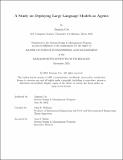A Study on Deploying Large Language Models as Agents
Author(s)
Cao, Jiannan
DownloadThesis PDF (3.381Mb)
Advisor
Williams, John R.
Terms of use
Metadata
Show full item recordAbstract
This thesis investigates the deployment and utilization of Large Language Models (LLMs) as agents, exploring their potential in automating workflows and enhancing user interactions. The study begins with an in-depth analysis of language models, tracing their evolution from pure statistical models to advanced neural network architectures like Transformers and their bidirectional variants. It then delves into the operational framework of LLM agents, detailing user interactions, environmental considerations, memory management, task planning, and tool use. The study addresses critical limitations in LLM inputs, such as the context window and introduces Retrieval-Augmented Generation (RAG) as a solution to extend the model’s capability. Key APIs provided by OpenAI for deploying GPT models are discussed, highlighting their functionalities and applications. Finally, the practical application of LLMs in creating Robotic Process Automation (RPA) workflows is demonstrated through a divide-and-conquer methodology, showcasing the efficiency, scalability, flexibility, and accuracy of this approach. This comprehensive study underscores the transformative impact of LLMs in automating complex processes and enhancing user experiences through intelligent agent deployment.
Date issued
2024-09Department
System Design and Management Program.Publisher
Massachusetts Institute of Technology